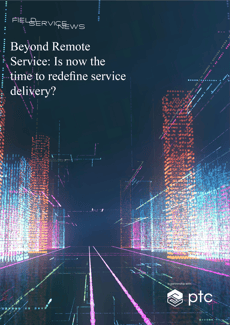Service is a differentiator. Remote service is no different
Apr 05, 2021 • Features • Digital Transformation
In the third article in a series of excerpts from a brand new white paper authored by Kris Oldland, Editor-in-Chief, Field Service News published in partnership with PTC, we discuss the importance of service as a differentiator and outline why this thinking must apply also to remote service solutions...

This feature is just one short excerpt from an exclusive Field Service News White Paper published in partnership with PTC
www.fieldservicenews.com subscribers can read the full white paper now by hitting the button below.
If you are yet to subscribe you can do so for free by hitting the button and registering for our complimentary subscription tier FSN Standard on a dedicated page that provides you instant access to this white paper PLUS you will also be able to access our monthly selection of premium resources as soo as you are registered.
 Data usage note: By accessing this content you consent to the contact details submitted when you registered as a subscriber to fieldservicenews.com to be shared with the listed sponsor of this premium content PTC who may contact you for legitimate business reasons to discuss the content of this white paper, as per the terms and conditions of your subscription agreement which you opted into in line with GDPR regulations and is an ongoing condition of subscription.
Data usage note: By accessing this content you consent to the contact details submitted when you registered as a subscriber to fieldservicenews.com to be shared with the listed sponsor of this premium content PTC who may contact you for legitimate business reasons to discuss the content of this white paper, as per the terms and conditions of your subscription agreement which you opted into in line with GDPR regulations and is an ongoing condition of subscription.
It has long been established that service is a core differentiator amongst competing organisations. A wide-reaching IDC study from 2018 revealed that over two-thirds of consumers stated that customer satisfaction was more important than price when doing business with a company. A study from the same year from Gartner also outlined that by 2020 81% of companies expected to be competing mostly or solely on the basis of Customer Experience.
These findings would appear to be staying on course and have continued throughout the pandemic also. In a 2020 study by Field Service News Research, it was revealed that 70% of field service companies stated that they believe service excellence will remain a key differentiator post-pandemic.
Yet, while differentiating on service standards is a widely accepted best-practice, to do so often requires innovation which has been a challenge for many organisations to overcome. Indeed, an excellent study out of the University of Linkoping, Sweden identified this trend over a decade ago, where after speaking to over 300 manufacturers, the paper outlined how ‘a strong emphasis on service differentiation can lead to a manufacturing firm’s strategies for customer centricity becoming less sensitive to increasingly complex customer needs.’
Some ten years on, as we face massive shifts not just in how we, as service providers, approach service delivery but with the rising complexity of our customers’ needs increasing dramatically in the last twelve months, this challenge appears to be magnified even further. Yet, at the same time, the tools at our disposal, to overcome these challenges have never been more widely available, and solutions that genuinely empower service organisations to innovate around their service offering are not only technologically advanced but in the case of solution providers like PTC, are reliable, mature and easily deployed.
"While over three quarters (76%) of field service companies have the capabilities to read data from the field, only a fifth of these companies (21%) state that they have the ability to utilise the data effectively..."
However, as we outlined in the opening pages of this paper, the most recent data would seem to suggest that while the concept of remote service delivery has firmly taken root within our sector, there is currently a widening gulf between those using sophisticated tools to deliver service remotely, and those using a more fundamental approach.
Further to the findings around the relatively limited use of Augmented Reality within remote service delivery, we also see a similar trend when it comes to connectivity within field service, another critical aspect of an organisations ability to deliver remote service effectively. A study by Field Service News Research, for example, outlined that while over three quarters (76%) of field service companies have the capabilities to read data from the field, only a fifth of these companies (21%) state that they have the ability to utilise the data effectively.
So we find ourselves at an interesting set of conclusions that can help us further define how remote service should be woven into our service design strategy:
- Remote service has become a common mechanism of service delivery since the pandemic.
- There is a wide gap between best-in-class remote service delivery and the standard approaches currently used.
- Service standards have consistently proven to be a key differentiator for competing organisations
- The tools for effective remote service delivery that can be leveraged to help a service organisation provide a service level that can differentiate them from their competitors are available and well developed yet currently under-used within the sector.
It would seem that now is a crucial time for field service companies to not just embrace the concept of remote service delivery, but to take the opportunity to clearly define the value proposition of their service offerings and redesign our processes to incorporate remote-service within our processes, in areas where doing so can clearly enhance our service delivery standards.
We are currently in the midst of a perfect storm of innovation, and while technology remains the enabler, not the end goal, what is possible today if we embrace technologies such as Robotic Process Automation (RPA), IoT and AR simply wasn’t possible before.
As we have explored in the previous segment of this paper, remote service is set to become an integral element of service delivery in the near future.
Therefore, it is essential we apply the same efforts on achieving service excellence regarding remote service as we would on-site service delivery and see these as two approaches as different but equally valid routes of service.
If the aim is service excellence, then that should be evident in all aspects of a service portfolio, be it remote or on-site service delivery.

This feature is just one short excerpt from an exclusive Field Service News White Paper published in partnership with PTC
www.fieldservicenews.com subscribers can read the full white paper now by hitting the button below.
If you are yet to subscribe you can do so for free by hitting the button and registering for our complimentary subscription tier FSN Standard on a dedicated page that provides you instant access to this white paper PLUS you will also be able to access our monthly selection of premium resources as soo as you are registered.
 Data usage note: By accessing this content you consent to the contact details submitted when you registered as a subscriber to fieldservicenews.com to be shared with the listed sponsor of this premium content PTC who may contact you for legitimate business reasons to discuss the content of this white paper, as per the terms and conditions of your subscription agreement which you opted into in line with GDPR regulations and is an ongoing condition of subscription.
Data usage note: By accessing this content you consent to the contact details submitted when you registered as a subscriber to fieldservicenews.com to be shared with the listed sponsor of this premium content PTC who may contact you for legitimate business reasons to discuss the content of this white paper, as per the terms and conditions of your subscription agreement which you opted into in line with GDPR regulations and is an ongoing condition of subscription.
Further Reading:
- Read more from Field Service News Research @ https://research.fieldservicenews.com/
- Read more about Digital Transformation @ https://www.fieldservicenews.com/blog/tag/digital-transformation
- Read more about Service Design and Innovation @ https://www.fieldservicenews.com/blog/tag/service-innovation-and-design
- Read more about Customer Satisfaction and Expectations @ https://www.fieldservicenews.com/blog/tag/customer-satisfaction-and-expectations
- Read more about Remote Service Delivery @ https://www.fieldservicenews.com/hs-search-results?term=REmote+Service
- Read more about the services PTC offer field service companies @ https://www.ptc.com/en/solutions/improving-efficiency/field-service-productivity
- Follow PTC on twitter @ https://twitter.com/PTC
- Read more articles by Kris Oldland @ https://www.fieldservicenews.com/blog/author/kris-oldland
- Connect with Kris Oldland on LinkedIN @ https://www.linkedin.com/in/kris-oldland-49a0171b






















 Field Service News is published by 1927 Media Ltd, an independent publisher whose sole focus is on the field service sector. As such our entire resources are focused on helping drive the field service sector forwards and aiming to best serve our industry through honest, incisive and innovative media coverage of the global field service sector.
Field Service News is published by 1927 Media Ltd, an independent publisher whose sole focus is on the field service sector. As such our entire resources are focused on helping drive the field service sector forwards and aiming to best serve our industry through honest, incisive and innovative media coverage of the global field service sector.
Leave a Reply